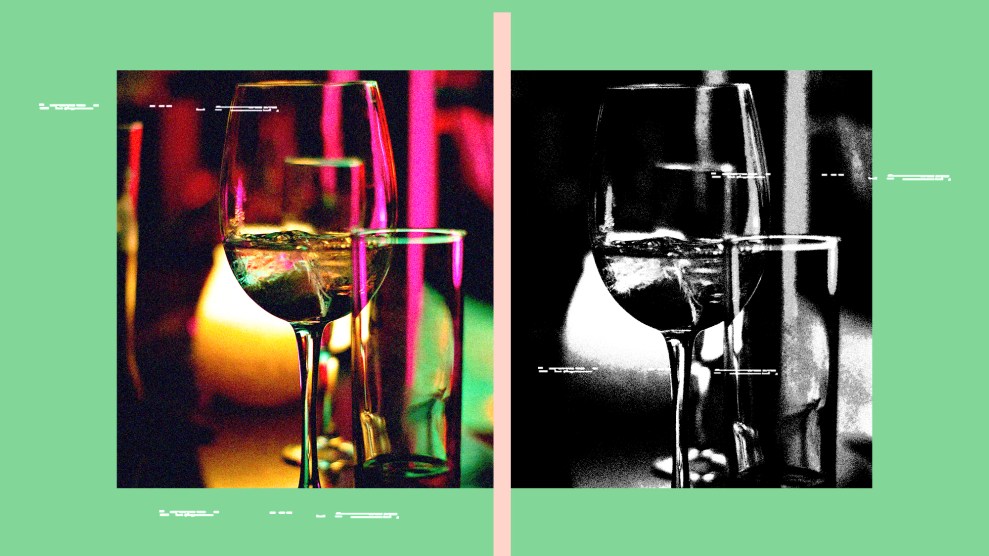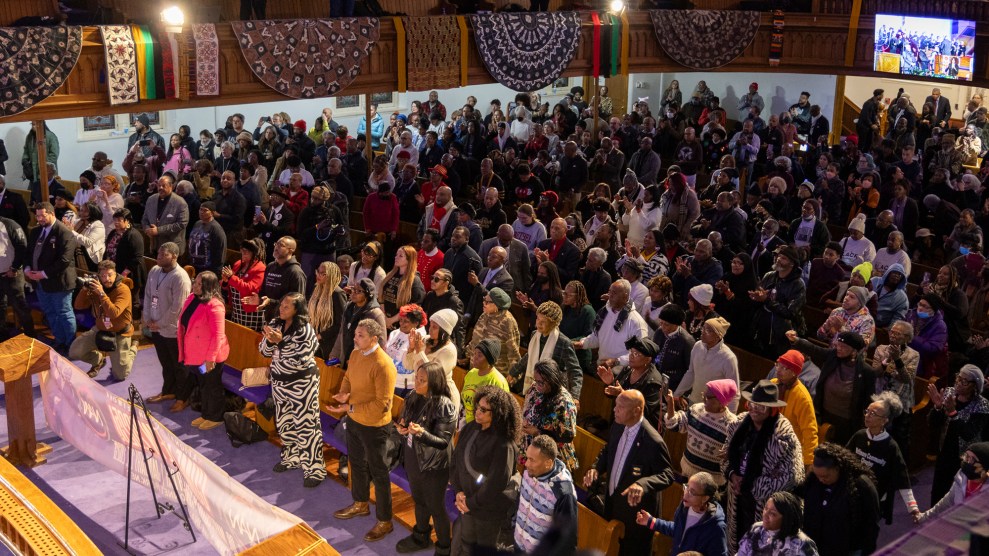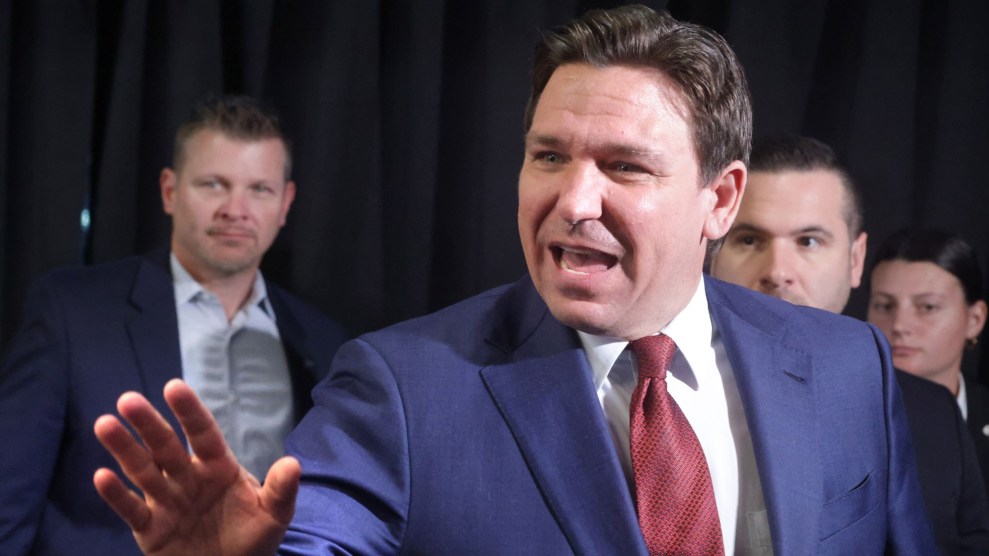
Mother Jones illustration; Sérgio Alves Santos
It wasn’t long ago when a daily glass of wine was considered safe, even healthy. The practice could confer onto someone a sense of sophistication, a realized version of whatever “bon vivant” means.
But in recent years, as multiple studies started to dismantle that notion of safety, I tended to mostly ignore what I had considered obvious: Alcohol is not great for you. (Duh? Meh?) Instead, I have slowly dialed down my consumption to align with what has been happening in real-time: the arrival of my first kid and all the attendant things that start at the outset of early middle age. Which is to say, I started drinking less, but I never once considered giving it up for good. In fact, if given the chance to go Tucker Carlson Dark, I’d need to consider an offer that could withstand a not-nothing martini budget.
So when the US surgeon general kicked off 2025 with a recommendation to include cancer warnings on alcoholic beverages, I was stunned by how clear-cut the message was. It landed, for me, with an unequivocal, self-assured ferocity that has since left me envisioning the brutal totality of all the alcohol I have consumed over nearly two decades. In these moments, a parade of evil-grinning beverages barrels down at me, taunting a future of illness. And all because I thought it was…fun? (But it is!)
Have I done life completely incorrectly? Has every outing that involved alcohol actually been a pathetic march to a hollowed-out future? I called up Dr. Jennifer Panning, a clinical psychologist in Evanston, Illinois, to hear how I—and probably many of you—should be processing all of this.
What have you been hearing in response to growing evidence of just how terrible alcohol is for us?
A lot of my clients are actually more in the sober or sober-curious realm. Some of that’s been for health reasons, menopause, and things like sleep disruption. There’s also been a more general realization that they don’t have to engage in the drinking culture to socialize or have fun.
So the recent surgeon general’s warning has been more of an affirming event than anything?
For some people, I think it probably has been validating. The notion of having wine as a healthy way to help your lifestyle is no longer as in vogue as it used to be.
What does the phrase “I have an alcohol problem” mean to you?
It tends to mean that an individual is identifying that there’s something wrong. That something is going on that they need or they’ve decided to seek professional help and acknowledge something to themselves as well.
Alcohol use disorder sees a lot of secrecy and denial to minimize true amounts of consumption. So when somebody has the ability to acknowledge a problem, we can try to shift this as an opportunity [for change]. Let’s understand what your concerns are and assess the negative impacts of your behavior.
There’s also a difference between people who identify as true alcoholics. Then some people are more problem drinkers. And I think in that category, we can talk more about harm reduction. That typically involves acknowledging that going out and having six drinks or nine drinks is not helping you. But for whatever reason, they don’t want to go into an abstinence model. So we’ll discuss what the threshold could be there, identify that as maybe two or three drinks max, and work on cutting themselves off with that. It’s all about people realizing the impacts of their behaviors. That could be an inability to get out of bed the next morning or they’re not feeling clear-headed at work. Their sleep is disrupted or they’re arguing with their partner. Maybe they’re not present with their kids. More serious use in terms of hard liquor every night is something that likely requires more specialized treatment and support.
“Your memories are your memories and honor them for what they are…They shouldn’t be tarnished because of what the surgeon general now says.”
The link between alcohol and anxiety has been clear for years now. And yet, as someone who enjoys her cocktails, I can’t help but feel anxious, amid all these studies, about what I’ll do without the occasional martini. And in the next minute, I’m downright panicked thinking about all the drinks I’ve had in my lifetime. How can people reconcile these competing anxieties?
That’s a really good insight. So, we know that chronic stress is really bad for our health too, right? We know that sitting every day is bad for our health. We know there are so many different things that are not ideal for our health. We live in an extremely high-pressure society. So we have to think about trade-offs. When people realize that the best part of their days is when they have a cocktail and that they’re not looking forward to anything else, it’s critical to interrogate what’s going on there. What do you need to readjust or have some more balance? For many people, they need more sleep. Instead of a cocktail then, maybe they should look into hiring a housekeeper or delegate more. Have their spouse take over kid duty.
If you focus on all the ways that we make mistakes and spend time beating ourselves up for those mistakes, that is ultimately very unproductive. We have to take the perspective of wanting to be as healthy as we can be. And how do we achieve that? What kinds of things do I need to work on my stress level?
I was recently talking to a friend about all of this, and they reminded me that we also grew up in an era when it was considered good and normal, even exciting, for kids to eat Lunchables tacos with meat sauce that dripped out of a plastic tube. Yet, we’re still here, and in relatively good health. I mean, even Jesus drank. Therefore, alcohol can’t be that bad.
As a therapist, what type of behavior or justification strategies would you say my friend and I are engaging in? Do you encourage this or am I doing something that should once again instill further anxiety?
“Guilt is rarely helpful. It’s only helpful when it helps us see something that we need to change. But if that’s not the case, then you need to release that guilt. “
I come back again to the idea that chronic stress is extremely bad for us. There is indisputable, countless research that has concluded exactly this. So we have to figure out the balance. Sure, you might be justifying or relying on different defense mechanisms; that’s simply part of being a normal human. But you can also see various past behaviors in the context of that period of life. An example: I have teenagers now and they barely want to be around me, so I’m in a moment when I’m adjusting to more free time and sleep. But when they were really little, it felt exhausting and challenging just to survive. We’re human. We have vices and stressors. We have patterns and habits, and we have to figure out how to how to make sense of all that. But it’s not easy. In this moment of time and our history and what’s happening sociopolitically, people are just very stressed out.
I was just about to say: With the election, non-stop climate catastrophes, and studies that black spatulas and booze are going to kill us, it just feels so bleak all the time. Have you noticed a general uptick in hopelessness? That I should just walk myself into the ocean? Nihilism?
It’s been difficult to support people. I live in a very progressive area and the shock of the election has left people feeling deeply unsettled and dreading. People are very much on edge. So I’m talking [to my clients] about what keeps them grounded. How do you grab onto your grounding and make sure that you are back in the present moment? Look at the fires right now. These people were living their lives three days ago and were completely unaware of what was coming for them. We simply don’t know the future. So living in the present moment and being present in the here and now are hugely important.
With anxiety, we talk a lot about what’s possible versus what’s probable. I often use this example. My day usually starts by parking in the garage down the street, and I go to my car after work. I’ll drive back to my house, but I won’t remember the drive because it won’t be significant. But if I left my office and I had a zombie apocalypse happening, I would have a very vivid memory of that. But how likely is that to happen?
We have to learn how to recalibrate ourselves into the present moment and enjoy our loved ones in our community. Stay connected to people we care about and who care about us. Notice the beauty.
I had a really bad day a couple of days ago while traveling to Florida. But coming back to Chicago to this very cold weather, I suddenly looked up and noticed a beautiful sunset sky. It was almost as if I needed to notice it, to recognize and notice when there are moments of beauty. And sunsets are so fleeting. You notice them and five minutes later, the sky is gray. You simply have to take advantage and savor that moment. We have to remind ourselves that throughout history, during war and awful times, people were also getting married, having kids, and celebrating.
Yeah, I’ve been trying to teach myself that all that’s bad and good in life are not competing narratives. They coexist and you have to be aware of them.
Buddhism has some great principles around being present and having the dialectic of holding both. Yes, concerning things may be happening; we should not deny or ignore them. But what do we have control over? What can we do and what are the choices that we can make to keep ourselves healthy and grounded?
As a non-public health professional, do you think it’s helpful to speak about alcohol consumption, or consumption in general, in such absolutist language?
I’ve been talking a lot this week about goals and resolutions. And I’m encouraging people to look more at the process than the outcome. People who say they would like to start exercising three times a week. That’s a reasonable goal and we can talk about the benefits they believe they will get out of that. But also, what’s going to happen when life gets in the way? When you can only work out once a week? Instead of looking at this as a failure, I encourage people to see this as going from zero to once a week. That’s still progress, right?
With alcohol, if someone has identified they want to reduce their alcohol use, I’d ask what they can do in a processed way to reduce it. Because the nuance is important. As therapists, we help people understand the wins. Even one small change is a win. Doing something different than your usual pattern, that’s a good thing, and that’s a win. We want to reinforce that and look at how you can take that and also learn from that for the future.
Can you talk about the role of guilt in these discussions and how we should approach it in light of the surgeon general’s warning?
Guilt is rarely helpful. It’s only helpful when it helps us see something that we need to change, right? Like when people take a hard look at themselves and realize that they depend too much on alcohol. But if that’s not the case, and you’ve done the self-analysis to understand that that’s not the case, then you need to release that guilt. Again, guilt can be good if it’s a signal that a change really is necessary. An example: As a parent, it’s normal to lose your temper with the kids sometimes. But if you have constant guilt about that, you should also understand that you don’t have to be a perfect parent. But on the other hand, if you’re recognizing that you are constantly yelling at your kid, that’s a problem, right? So that guilt can help us understand that better. But if it’s something that we’re using to beat ourselves up further, that’s not helpful.
At the risk of sounding like I have a genuine problem, some of my fondest memories of all time tend to involve some level of drinking. Wandering around, being silly and loud with best mates. Now they feel slightly tarnished. That might be a natural response, but it also feels toxic, like I’m engaging in self-flagellation. How can we move forward with a more healthy lifestyle but maintain self-respect and fondness for those memories?
As we get older, we all look back on these memories. I was talking to a friend the other day and we were recalling those earlier days when we could stay out all night and listen to music until 2 am on a Tuesday. That’s not my life anymore. But there’s fondness about those carefree days, a nostalgia of when life seemed simpler. We all engage in reminiscing and having a little bit of rose-colored glasses.
But I would say that your memories are your memories and honor them for what they are. They both were and are meaningful. It sounds like [memories that involved alcohol] also brought you joy and a lot of fulfillment. It’s important to acknowledge that that fondness matters. They shouldn’t be tarnished because of what the surgeon general now says. As we grow and develop, we have to have compassion for ourselves. I also have memories of college, doing dumb things, and having fun with friends. Sure, I wouldn’t make those same decisions now. But those memories were a part of my growth path and they were significant.

















